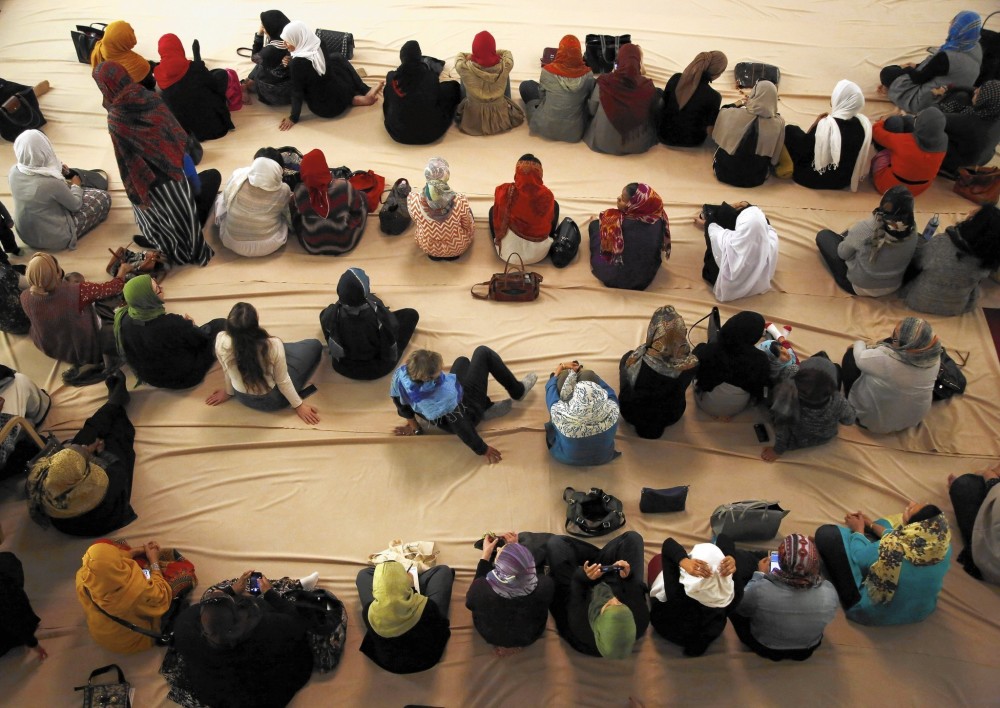By Sarah Parvini
Los Angeles Times.
The women sit on their knees, watching intently as a slightly sheepish sister in a pink head scarf crosses the beige floor and approaches the dais. After a moment, her jitters are gone and, in a booming voice, she recites the Islamic call to prayer.
In what may have been a unique moment in America, more than 100 women gathered Friday at the interfaith Pico-Union Project.
While many mosques continue to follow a tradition of separating women from male congregants, the downtown Los Angeles mosque forbids men from attending.
Female-only mosques may exist in China, Chile and India, but Muslim leaders say this could be the first in the U.S.
The inaugural prayer Friday marked the launch of the Women’s Mosque of America, a nonprofit that hopes to create a space where Muslim women can “bring their whole self,” learn more about their faith and foster bonds of sisterhood.
“Muslim women haven’t had a forum,” Yasmeen Ruhge, a cardiologist from Pasadena, said as she waited for the service to begin.
“When we go to the mosque we have to sit on one side. Not that we aren’t equal, but this gives us a freedom to talk as all women and create an independent role.”
About two-thirds of U.S. mosques use a divider to separate men and women during morning prayers, according to a 2011 study on American mosques co-sponsored by the Islamic Society of North America. That figure could be higher for Friday prayers, the study said.
Because many spaces for women in many mosques are not as appealing or accessible as the areas for men, an open environment is integral for growth, said Sana Muttalib, co-president of the women’s mosque. Often, women are forced to enter through side or back doors to reach their segregated areas, she explained.
In most mosques, women are hard-pressed to find the opportunity to ask the imam questions after prayer. But on Friday, a female speaker (or khateeba) addressed women’s issues and held a discussion circle after the prayer service.
Many women expressed their gratitude at the chance to share their thoughts. Some cried and called the experience liberating.
But a lack of female perspective isn’t unique to the Muslim community, said M. Hasna Maznavi, who started the organization with Muttalib. Although the prayer space is for women only, other events and classes will be open to men.
“When only half of the membership is contributing to the success of the whole, we’re not going to be as well-off as we could be,” she said.
The new mosque has been embraced around the globe, not just nationally, Muttalib said. She said support has come, not only from women eager to learn more or hoping to start their own chapter, but from men.
The call for female empowerment in the Muslim community has been growing for years — a response aimed at combating an often-misguided view of Islam, experts say.
“One of the major ways that Islam is ‘othered’– one of the major stereotypes — is how they treat women,” said Ruqayya Khan, chairwoman of Islamic studies at Claremont Graduate University. “But there is a rich history of women in Islam, and it’s often kind of sidelined or buried.”
Both Muslim women and men can work to reclaim the importance of those female figures, she said. Female empowerment is an important step, Khan said, because it is not an “in-your-face, radical” move, yet it still supports female Muslim leaders.
“Maybe out of this space we could find a woman who is able to think in terms of reform in Islam,” she said. “Maybe we could get a female Luther out of this.
buy kamagra effervescent generic buy kamagra effervescent online no prescription
Wouldn’t that be exciting?”
For Ani Zonneveld, head of Muslims For Progressive Values, the new mosque presents an opportunity to help women feel more comfortable and set an example for future generations.
“It’s about spiritual leadership,” Zonneveld said. “When women bring their young boys and they see women leading the prayer, they can initiate change as they grow up.”














































































































































































































































































































































































